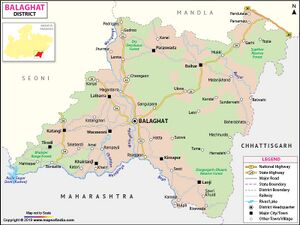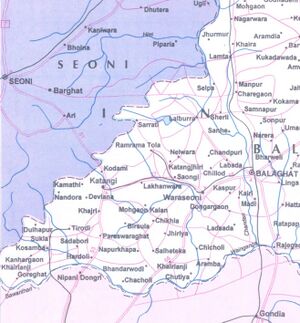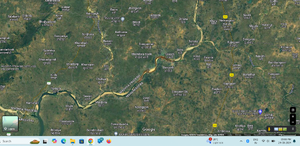Beni
| Author:Laxman Burdak, IFS (R) |



Beni (बेणी) is a historical village in Khairlanji tahsil in Balaghat district of Madhya Pradesh. It is situated on Wainganga River near the border of Maharashtra. It is mentioned as Bennakata (बेन्नाकट) mentioned in Tirodi Copper Plate Inscription of the Maharaja Pravarasena II (c.400 - 415).[1]
Variants
- Bennakata (बेन्नाकट) mentioned in Tirodi Copper Plate Inscription of the Maharaja Pravarasena II (c.400 - 415).
- Bennakarpara (वेण्णाकारपर)
- Beṇṇākarpara-bhoga/Bennakarparabhoga (वेण्णाकरपर-भोग) mentioned in Siwani Plates of 18th year of Pravarasena II[2] = Beni (बेणी). Beni (बेणी) is a historical village in Khairlanji tahsil in Balaghat district of Madhya Pradesh. It is situated on Wainganga River near the border of Maharashtra.
- Venna (वेण्णा) Mahabharata (R)/(T) (II.9.18), (II.9), (III.83.29), (III.83.31), (III.86.3),(VI.10.26),
- Venakata (वेणाकट)
Location
Beni is a Village in Khairlanji Tehsil in Balaghat District of Madhya Pradesh State, India. It is located 25 KM towards South from District head quarters Balaghat, 25 KM from Khairlanji. Beni Pin code is 481226 and postal head office is Hatta (Balaghat). Satona ( 3 KM ) , Changera ( 3 KM ) , Dinera ( 6 KM ) , Dongarmali ( 6 KM ) , Siwanghat ( 7 KM ) are the nearby Villages to Beni. Beni is surrounded by Waraseoni Tehsil towards west , Kirnapur Tehsil towards East , Khairlanji Tehsil towards west , Balaghat Tehsil towards North.[3]
Jat Gotras Namesake
- Beniwal (बेणीवाल) (Jat clan) → Bennakata (बेन्नाकट) mentioned in Tirodi Copper Plate Inscription of the Maharaja Pravarasena II (c.400 - 415). Beni (बेणी) is a village in Khairlanji tahsil in Balaghat district of Madhya Pradesh.
- Beniwal (बेणीवाल) (Jat clan) → Beṇṇākarpara-bhoga (वेण्णाकरपर-भोग), territory in which Brahmapuraka (ब्रह्मपूरक) village was situated, mentioned in Siwani Plates of 18th year of Pravarasena II [4].
History
Tirodi Copper Plate Inscription of the Maharaja Pravarasena II (c.400 - 415) [5] mention Beni .... The plates were issued from Narattangavari (नरत्तंगवारी) by the Vakataka Maharaja Pravarasena II. The object of record the grant of the village Koshambakhanda (कोशम्बखण्ड) to a Brahmana named Varunarya (वरूणार्य) (Of the Harkari and the Atharvaveda, who was a resident of Chandrapura (चान्द्रपुर) and was proficient in three Vedas. The donated village was bounded on the east by Jamali (जमली), on the south by Vardhamanaka (वर्धमानक), on the west by Mrigasima (मृगसिम) and on the north by Mallakapedhaka (मल्लकपेधक). (p.48). ...The donated village was situated in Bennakata (बेन्नाकट). ...Kosambakhanda, the donated village, is evidently Kosamba, about 6 miles to the north-east of Tirodi, where the plates were found. ....Kosamba, which now represents ancient Koshambakhanda, is only 20 miles from the Wainganga, and was evidently included in the western division (apara-patta) of Bennakata.....Bennakata was evidently a district7 comprising the territory round the modern village Beni (बेणी), 35 miles to the east of Kosamba in the Gondia tahsil of the Bhandara District, which may have been its headquarters. The district seems to have been divided into two parts by the river Benna (बेन्ना), modern Wainganga8. (p.49)
7. Bhojakata is another name ending in kata. The Mahabharata, Sabhaparvan, adhyaya 31, vv. 10-12, states that Sahadeva vanquished the lords of Bhojakata and Venakata. The name of the latter occurs as Venakata (वेणाकट) in many Grantha MSS. of the epic.
8. Bennakarpara-bhoga (बेण्णाकारपर-भोग) mentioned in the Siwani plates is another territorial division named after the river Benna. As shown elsewhere, the villages mentioned as situated therein can be identified in the Amgaon Zamindari, east of the Wainganga.
Siwani Plates of 18th year of Pravarasena II[6] record the grant, by Pravarasena II, of the village Brahmapūraka (ब्रह्मपूरक) to the Brahmana Devaśarmāchārya of the Maudgalya gotra. (p.28)
The donated village, Brahmapūraka (ब्रह्मपूरक), was situated in the Beṇṇākarpara-bhoga (वेण्णाकरपर-भोग) and lay to the north of Vaṭpūraka (वटपूरक), to the west of Kiṇihikheṭaka (किणिहिखेटक), to the south of Pavarajjavātaka (प्रवरज्जवाटक) and to the east of Kollapūraka (कोल्लपूरक) . The village adjoining it was named Karañjaviraka (करञ्जविरक). The grant was made on the 12th tithi of the bright fortnight of Phalguna in the eighteenth regnal year (expressed in words) of Pravarasena II. The Senapati at the time was Bāppadeva. The charter was written by Acharya.
The localities mentioned in the present plates remained unidentified for a long time. Altekar identified Brahmapuraka (ब्रह्मपूरक) with Brahmanwada (ब्राहमणवाडा) near Achalpur. This is incorrect as none of the other villages can be identified in the vicinity of Brahmanwada.
Identification by Vasudev Vishnu Mirashi: Vasudev Vishnu Mirashi[7] has identified the localities mentioned as under:
- Karanja (करंजा), about 6 miles from Amgaon, a railway station on the Calcutta-Nagpur line of the South-Eastern Railway, is probably the ancient Karanjaviraka (करञ्जविरक).
- Brahmapuraka (ब्रह्मपूरक), the donated village, is Bamhani (बमहनी), about three miles from Karanja.
- Kollapūraka (कोल्लपूरक) of the plates is now represented by Kulpa near Karanja, about 5 miles to the west of Bamhani.
- Pavarajjavātaka (प्रवरज्जवाटक) and Vatapuraka (वटपूरक) may be the modern Paraswada and Badgaon near Bamhani6. These places lie within 20 to 30 miles from the eastern bank of the Wainganga and were in all probability included in the Bennakarpara-bhoga mentioned in the present plates. (p.29)
Identification by Author (Laxman Burdak): Author (Laxman Burdak) has identified these places as under:
- Brahmapuraka/ Brahmapūraka (ब्रह्मपूरक) mentioned in Siwani Plates of 18th year of Pravarasena II[8] = Bamhani (बम्हनी). Bamhani (बम्हनी) is a village in Kirnapur tahsil in Balaghat district of Madhya Pradesh. It is located on eastern bank of Wainganga River.
- Beṇṇākarpara-bhoga/Bennakarparabhoga (वेण्णाकरपर-भोग) mentioned in Siwani Plates of 18th year of Pravarasena II[9] = Beni (बेणी). Beni (बेणी) is a historical village in Khairlanji tahsil in Balaghat district of Madhya Pradesh. It is situated on Wainganga River near the border of Maharashtra.
- Vaṭpūraka//Vatpuraka (वटपूरक) mentioned in Siwani Plates of 18th year of Pravarasena II[10] = Badgaon. Badgaon is a village in Lanji tahsil in Balaghat district of Madhya Pradesh.
- Kiṇihikheṭaka/Kinihikhetaka (किणिहिखेटक) mentioned in Siwani Plates of 18th year of Pravarasena II[11] = Kinhi (किन्ही). Kinhi (किन्ही) is a village in Kirnapur tahsil in Balaghat district of Madhya Pradesh. It is situated on the eastern bank of Bagh River, a tributary of Wainganga.
- Pavarajjavātaka (प्रवरज्जवाटक) mentioned in Siwani Plates of 18th year of Pravarasena II[12] = Paraswada (परसवाड़ा). Paraswada (परसवाड़ा) is a village in Lanji tahsil in Balaghat district of Madhya Pradesh.
- Karañjaviraka/Karanjaviraka (करञ्जविरक) mentioned in Siwani Plates of 18th year of Pravarasena II[13] = Karanja (करंजा). Karanja (करंजा) is a village in Lanji tahsil in Balaghat district of Madhya Pradesh.
Notable persons
Gallery
Population
External links
References
- ↑ Corpus Inscriptionum Indicarum Vol.5 (inscriptions Of The Vakatakas), pp.48-52
- ↑ Corpus Inscriptionum Indicarum Vol.5 (inscriptions Of The Vakatakas), Edited by Vasudev Vishnu Mirashi, 1963, Archaeological Survey of India, p.28-32
- ↑ https://www.onefivenine.com/india/villages/Balaghat/Khairlanji/Beni#google_vignette
- ↑ Corpus Inscriptionum Indicarum Vol.5 (inscriptions Of The Vakatakas), Edited by Vasudev Vishnu Mirashi, 1963, Archaeological Survey of India, p.28-32
- ↑ Corpus Inscriptionum Indicarum Vol.5 (inscriptions Of The Vakatakas), pp.48-52
- ↑ Corpus Inscriptionum Indicarum Vol.5 (inscriptions Of The Vakatakas), Edited by Vasudev Vishnu Mirashi, 1963, Archaeological Survey of India, p.28-32
- ↑ Corpus Inscriptionum Indicarum Vol.5 (inscriptions Of The Vakatakas), Edited by Vasudev Vishnu Mirashi, 1963, Archaeological Survey of India, p.28-32
- ↑ Corpus Inscriptionum Indicarum Vol.5 (inscriptions Of The Vakatakas), Edited by Vasudev Vishnu Mirashi, 1963, Archaeological Survey of India, p.28-32
- ↑ Corpus Inscriptionum Indicarum Vol.5 (inscriptions Of The Vakatakas), Edited by Vasudev Vishnu Mirashi, 1963, Archaeological Survey of India, p.28-32
- ↑ Corpus Inscriptionum Indicarum Vol.5 (inscriptions Of The Vakatakas), Edited by Vasudev Vishnu Mirashi, 1963, Archaeological Survey of India, p.28-32
- ↑ Corpus Inscriptionum Indicarum Vol.5 (inscriptions Of The Vakatakas), Edited by Vasudev Vishnu Mirashi, 1963, Archaeological Survey of India, p.28-32
- ↑ Corpus Inscriptionum Indicarum Vol.5 (inscriptions Of The Vakatakas), Edited by Vasudev Vishnu Mirashi, 1963, Archaeological Survey of India, p.28-32
- ↑ Corpus Inscriptionum Indicarum Vol.5 (inscriptions Of The Vakatakas), Edited by Vasudev Vishnu Mirashi, 1963, Archaeological Survey of India, p.28-32

